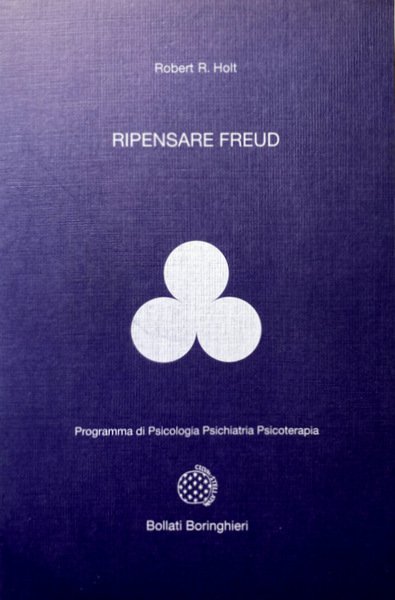
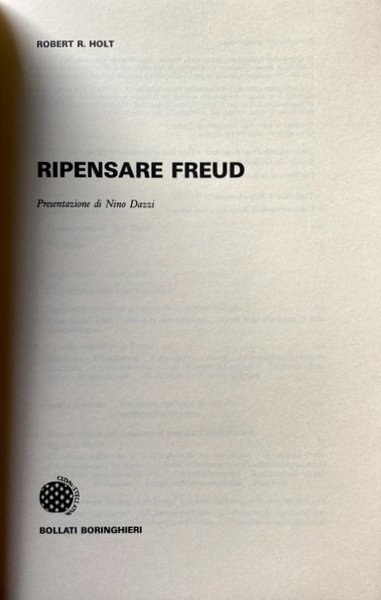
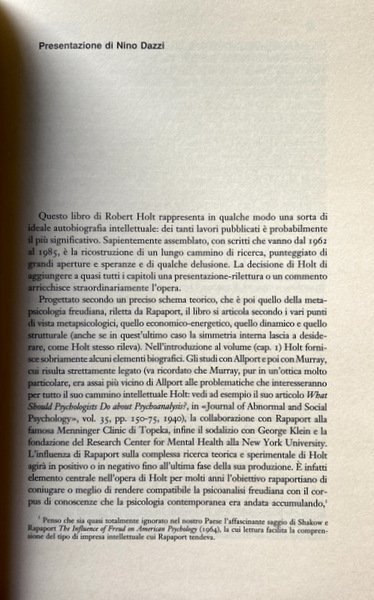
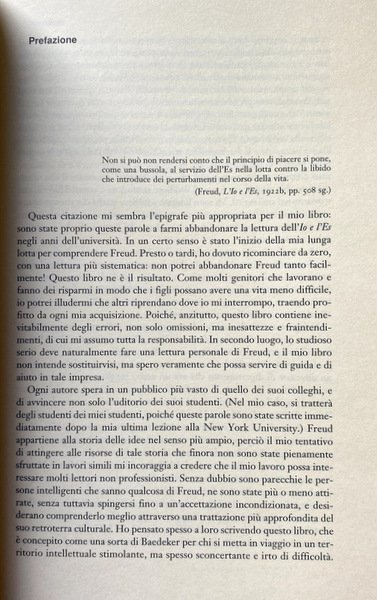
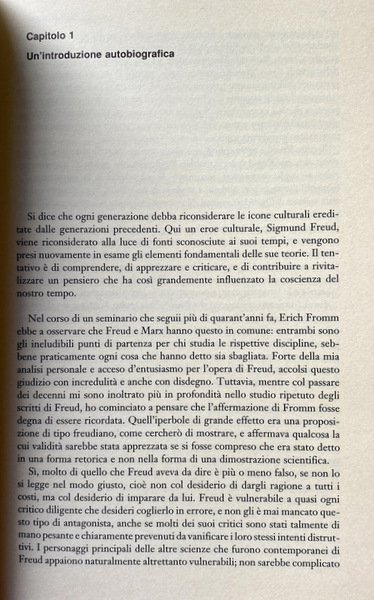
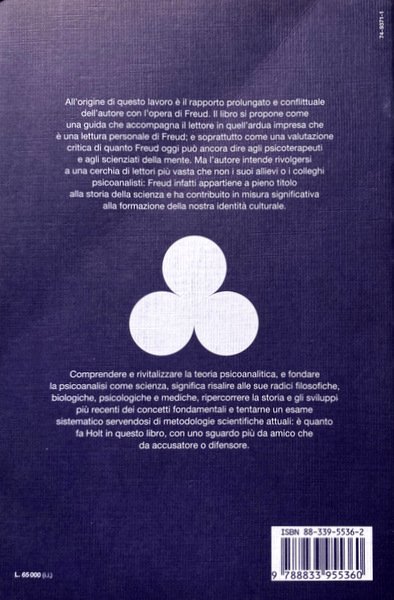
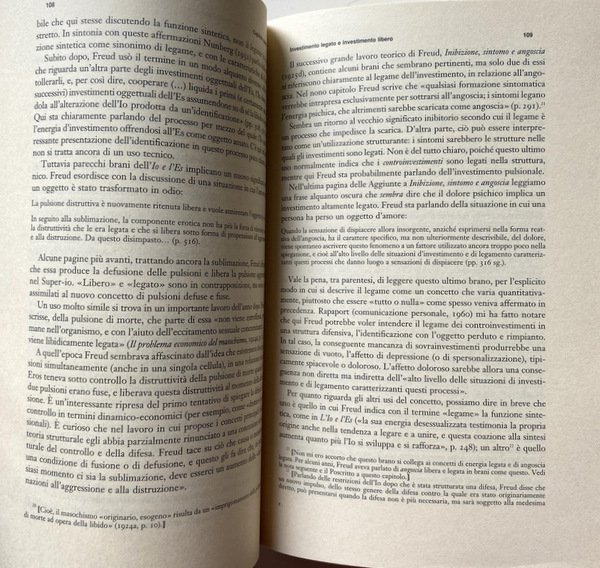
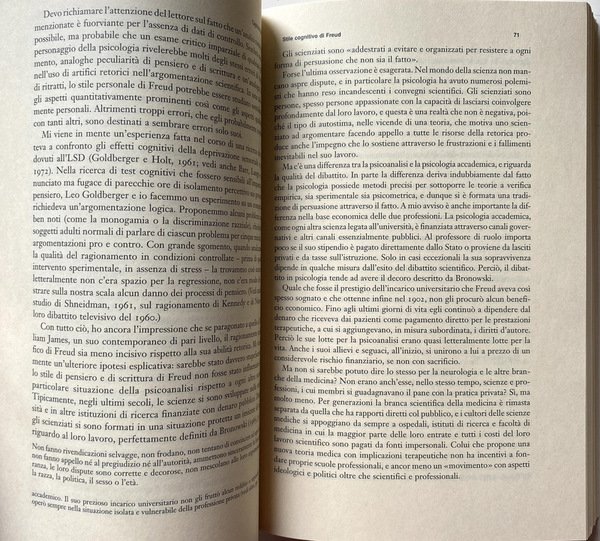
Libri antichi e moderni
Robert R. Holt
RIPENSARE FREUD
BOLLATI BORINGHIERI, 1994
32,39 €
Studio Maglione Maria Luisa
(Napoli, Italia)
Le corrette spese di spedizione vengono calcolate una volta inserito l’indirizzo di spedizione durante la creazione dell’ordine. A discrezione del Venditore sono disponibili una o più modalità di consegna: Standard, Express, Economy, Ritiro in negozio.
Condizioni di spedizione della Libreria:
Per prodotti con prezzo superiore a 300€ è possibile richiedere un piano rateale a Maremagnum. È possibile effettuare il pagamento con Carta del Docente, 18App, Pubblica Amministrazione.
I tempi di evasione sono stimati in base ai tempi di spedizione della libreria e di consegna da parte del vettore. In caso di fermo doganale, si potrebbero verificare dei ritardi nella consegna. Gli eventuali oneri doganali sono a carico del destinatario.
Clicca per maggiori informazioniMetodi di Pagamento
- PayPal
- Carta di Credito
- Bonifico Bancario
-
-
Scopri come utilizzare
il tuo bonus Carta del Docente -
Scopri come utilizzare
il tuo bonus 18App
Dettagli
Descrizione
All'origine di questo lavoro è il rapporto conflittuale dell'autore con l'opera di Freud. L'autore intende rivolgersi a una cerchia di lettori più vasta che non i suoi allievi o i colleghi psicoanalisti: Freud infatti appartiene alla storia della scienza e ha contribuito alla formazione della nostra identità culturale. Comprendere e rivitalizzare la teoria psicoanalitica significa risalire alle sue radici filosofiche, biologiche, psicologiche e mediche, ripercorrere la storia e gli sviluppi più recenti dei concetti fondamentali e tentarne un esame sistematico servendosi di metodologie scientifiche attuali: è quanto fa Holt in questo libro, con uno sguardo più da amico che da accusatore o difensore.
Descrizione bibliografica
Titolo: Ripensare Freud
Titolo originale: Freud Reappraised. A Fresh Look at Psychoanalytic Theory
Autore: Robert R. Holt
Curatore: Maria Antonietta Schepisi
Presentazione di: Nino Dazzi
Traduzione di: Marco Casonato
Editore: Torino: Bollati Boringhieri, Giugno 1994
Lunghezza: 436 pagine; 23 cm
ISBN: 8833955362, 9788833955360
Collana: Programma di psicologia psichiatria psicoterapia
Soggetti: Psicologia freudiana, Psicanalisi, Saggi, Sigmund Freud, Merton Gill, George Klein, David Rapaport, Libri universitari, Scuole, Teorie, Filosofia, L'Io e l'Es, Jung, Terapia, Individualità e generalizzazione nella psicologia della personalità, Benjamin Rubinstein, Critica, Metapsicologia, Significati manifesti e latenti, Stile cognitivo, Metodo scientifico, Pensiero, Scrittura, Intelligenza, Carattere, Metafore, Analogie, Retorica, Studi psicoanalitici, Isteria, Psicosi, Personalità, Sessualità, Nevrosi, Piacere, Energia psichica, Masochismo, Biologia, Dottrine, Assunti biologici, Interpretazione dei sogni, Scritti, Analisi, Vitalismo, Meccanicismo, Pulsioni, Desiderio, Dibattiti, Libertà, Libero arbitrio, Processo primario, Animismo, Narcisismo, Bibliografia, Manuali, Wallerstein, Strachey, Whitehead, Wolff, Schafer, Rubinstein, Piaget, Gill, Hartmann, Helmholtz, Bergson, Darwin, Brucke, Breuer, Critici, Opere generali, Freudian psychology, Psychoanalysis, Essays, University books, Schools, Theories, Philosophy, The ego and the id, Jung, Therapy, Individuality and generalization in personality psychology, Critique, Metapsychology, Manifest and latent meanings, Cognitive style, Scientific method , Thinking, Writing, Intelligence, Character, Metaphors, Analogies, Rhetoric, Psychoanalytic studies, Hysteria, Psychosis, Personality, Sexuality, Neurosis, Pleasure, Psychic energy, Masochism, Biology, Doctrines, Biological assumptions, Dream interpretation, Writings, Analysis, Vitalism, Mechanism, Drives, Desire, Debates, Freedom, Free will, Primary process, Animism, Narcissism, Bibliography, Manuals, Critics, General works
FREUD REAPPRAISED is a comprehensive and authoritative critique of the fundamental theory of psychoanalysis. It is the first appraisal to consider the humanistic and philosophical as well as the biological, psychological, and medical aspects and antecedents of psychoanalytic theory. With the eye of a concerned friend rather than an attacker or defender, Robert R. Holt, an internationally recognized Freud scholar, presents an erudite analysis of the ills of psychoanalysis. The volume serves as a guide to the reading of Freud and offers a new depth of understanding of the many influences that affected Freud's thought and work.
The volume opens with an historical overview that examines the meanings of the basic theory of psychoanalysis (which Freud called metapsychology), its relation to clinical theory, its development and personal significance to Freud. Dr. Holt also discusses Freud's cognitive style, showing how Freud's unique modes of thinking and writing can easily lend themselves to misinterpretation of his essential message.
Three sections, which constitute the bulk of the work, respectively take up the economic, dynamic, and structural points of view that comprise metapsychology. Each section presents the origins and intellectual history of the major concepts and describes how Freud came to adopt them. Every segment of theory is examined for its underlying philosophical assumptions, its internal consistency, how well it squares with relevant facts, and how tenable it is by the canons of scientific methodology. Because Freud never ceased amending the theory while he lived, the approach takes into consideration the ways in which it developed. The book closes an assessment of psychoanalytic theory as a whole, discussion of major developments since Freud's death, and an appraisal of the prospects for its reform and reinvigoration.
More comprehensive than other works on Freud's attempts to construct a scientific theory and more systematic in its consideration of all aspects of metapsychology, this book will be required reading for all serious students of psychoanalytic theory.
Beginning students will find that it explains and clarifies much of what is mystifying or difficult to understand in Freud's work, while the most advanced scholars will be challenged to take a position on Holt's call for fundamental reform. Clinicians who use psychoanalytic theory to any extent will profit from its guidance in holding fast to the parts of Freud's work that have proved lastingly valuable while revising or discarding what is fallacious, anachronistic, or otherwise flawed. Those who are drawn to intellectual history, teachers of psychology and the other disciplines that have been impacted by psychoanalysis, and anyone who has been interested in Freud's ideas while having doubts, confusion, or misgivings about the theory will find the book valuable.

